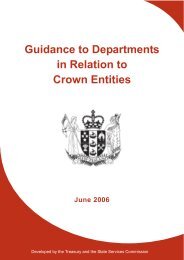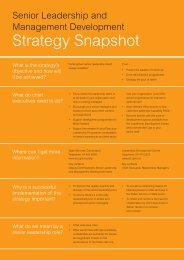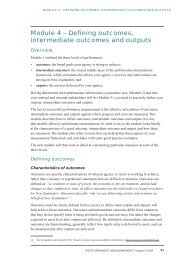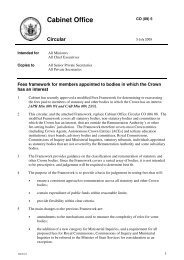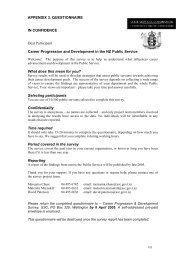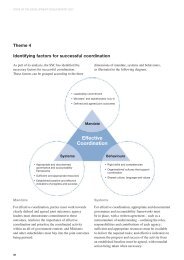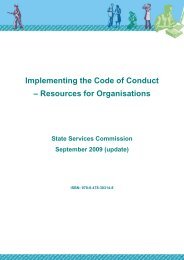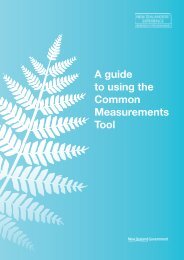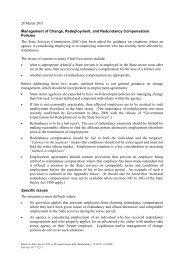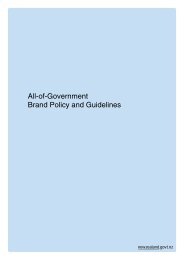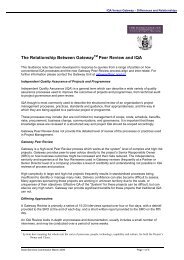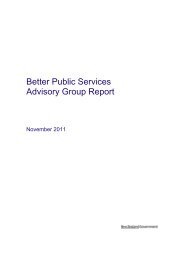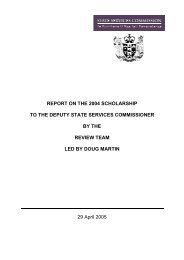NZ Report / Proposal Template - State Services Commission
NZ Report / Proposal Template - State Services Commission
NZ Report / Proposal Template - State Services Commission
You also want an ePaper? Increase the reach of your titles
YUMPU automatically turns print PDFs into web optimized ePapers that Google loves.
• high levels of support from parent companies in support of the contracting<br />
arrangement (as reflected by senior representation on what is referred to as the<br />
Principals Group).<br />
5.43 The CWA approach is aimed at fostering a best-for-project approach through a<br />
“no-blame-no-claim” culture where all parties have a unity of purpose to achieve a<br />
successful outcome. Decision making in regard to the project is conducted through a<br />
Principals Group. Decisions by the Principals Group are made on a unanimous basis;<br />
that is, all parties have to agree.<br />
5.44 In traditional fixed price contracts, the principal point of focus is the price that is<br />
paid for the services. Under the CWA approach, the focus is on the efficient level of costs<br />
because this is the amount that the client, in theory, pays for the services.<br />
Background To CWA for Prison Construction<br />
5.45 The CWA methodology has been used in the context of the Northland (albeit in<br />
hybrid form) and the recently opened Auckland Women’s prison. The Northland prison<br />
commenced as a traditional <strong>NZ</strong>S 3910 contract. However, by August 2003, several<br />
factors pointed toward the need to modify the contractual approach to construction:<br />
• financial pressure on one critical consultant was such that it was doubtful if they<br />
would continue;<br />
• there was evidence of on-site “man-marking” where significant effort was being<br />
directed toward allocating blame rather than resolving issues; and<br />
• the construction programme was not universally agreed among the parties<br />
involved.<br />
5.46 In considering the options open to the Department, CWA was raised as a potential<br />
way forward. Several points are worth noting in this regard.<br />
• We understand that Mainzeal had for some time been considering alternative<br />
forms of procurement including alliancing.<br />
• Stewart Rix (of CMS) had considerable experience of CWA from previous roles in<br />
the United Kingdom (where CWA and alliancing generally is more commonplace).<br />
A meeting between CMS and the RPDP Project Director (John Hamilton) to<br />
present on CWA was arranged at the instigation of the Chair of the Inmate<br />
Employment Advisory Committee. CMS also presented to Hawkins Construction<br />
Ltd (the main contractor on the Auckland Women’s and Otago projects).<br />
• When difficulties with Northland emerged, the RPDP Project Director approached<br />
CMS out of which came a suggestion to convert the contractual framework for<br />
Northland to a CWA agreement (the Northland project had been running on-site for<br />
approximately six months). Mainzeal were the prime contractors for the Northland<br />
project.<br />
5.47 At the August 2003 meeting of the RPDP Steering Group, the Project Director<br />
provided an oral briefing on the proposal to enter into a hybrid form of CWA (the hybrid<br />
arrangements retained an element of the former <strong>NZ</strong>S 3910 contract including, in<br />
particular, a cap on construction costs). The meeting approved in principle the change to<br />
Methodology and Processes: Design, Costing, Procurement and Scheduling 36



